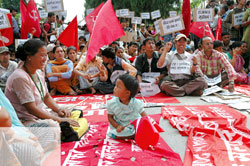|
|
| The future is present: Maoist demonstrators outside the prime minister\'s residence in Baluwatar where summit talks were underway on Thursday. |
When the news finally came out of Baluwatar on Thursday afternoon, it wasn't the breakthrough everyone expected. But it wasn't a breakdown either.
The top-level talks between the Maoists and the seven-party government will continue over the weekend, and both sides appear close to a deal. The stumbling blocks are the same as they were six months ago: the Maoists don't want to disarm completely before a political resolution and the seven parties want them to.
The Maoists are also holding out for a republic and dissolution of parliament, and there are signs of persistent squabbling within the governing alliance. Yet, Girija Prasad Koirala and Pushpa Kamal Dahal seem determined to see a deal. A historic agreement is tantalisingly close and a success would turn both into statesmen that can reap the peace dividend.
In contrast with previous posturing, both sides are surprisingly upbeat. They present a positive front in joint press meets and stress progress rather than obstacles. "We have significantly narrowed down differences after a series of consultations and hopefully we will come up with definite conclusion on Sunday," said Maoist spokesperson Krishna Bahadur Mahara.
Home Minister Krishna Sitaula also oozed optimism. "The leaders are showing willingness to work for lasting peace and so we need more time," he said.
For internal reasons, the rebels may have to grandstand on erasing the king from the constitution altogether. Then there is the issue of arms management which is of vital importance in the lead up to proposed elections to a constituent assembly in mid-2007. This issue reportedly also came up in Dahal's talk with special UN envoy Ian Martin on Thursday morning.
That election will be intensely polarised over the issue of monarchy, and a weapon-free environment is important to make it free and fair. Those polls will also decide on how to restructure the state and assure proportional representation to remove the roots of future conflict.
But for national and international players there are more specific issues at stake. The political futures of the alliance members hinge on the outcome of the constituent assembly. Even if the Maoist army is interned, its militia could sway voting in many districts. But the rebels could lose control of parts of their militia and could be hit by the repercussions of the militant ethnic groups they've unleashed.
For them, the only safe landing is through elections that will be accepted as legitimate. The international community, including the United Nations and particularly the United States are loath to support elections or an interim government where one party controls a parallel military. Senior members of the UN team are in town, waiting for agreement on the mechanics of the election process and arms management.
The challenge for the Maoists and the government now is to make the final push to breakthrough discussions. It's no surprise there are delays. After ten years of conflict, many talk-watchers say, it would be worrying if agreement came too easily.



